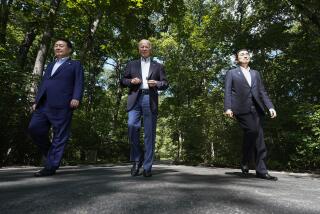U.S.-North Korean Semaphore : Signals fly as Washington seeks to open doors to a longtime enemy nation
- Share via
White House Press Secretary Dee Dee Myers cautions against inferring too much from the two sets of talks that U.S. and North Korean officials plan to open on Sept. 10. Clearly the Clinton Administration wants to avoid encouraging excessive expectations. But clearly, too, something is stirring, and the new movement is not lacking in political significance.
That’s especially true about the meetings that are scheduled to take place in Pyongyang. For the first time, American diplomats will be journeying to North Korea’s capital, there to talk about such matters as where the United States might rent residential and office space and how communications would be set up if the two countries exchange liaison missions. Such technical matters, of course, are not typically taken up years in advance of the time that missions are actually established. That’s why their political symbolism surely will be plain to the North Koreans. At a minimum, the message Washington wants to send is that it’s serious about improving relations with a country that has been its bitter enemy for nearly half a century.
De facto diplomatic recognition is one of the carrots the United States has offered if North Korea agrees to open its nuclear program to full international inspection and safeguards. U.S. help in upgrading North Korea’s electricity-generating nuclear power plants is another carrot, and that will the topic of the second set of talks starting Sept. 10, in Berlin. What the United States, South Korea, the United Nations and the International Atomic Energy Agency want from North Korea in return is an end to its efforts to build nuclear weapons and on-site inspections to determine whether diversion of nuclear material for weapons has already taken place.
So far Pyongyang has said only that it would freeze its nuclear program. It has yet to allow inspection of two sites that could reveal whether it has already developed a nuclear device. That’s on the agenda for still another set of talks later this month. Meanwhile, Washington is signaling a more flexible diplomatic line to the new North Korean leadership. That wig-wagging is welcome. How productive it might prove to be is now pretty much up to Pyongyang.
More to Read
Sign up for Essential California
The most important California stories and recommendations in your inbox every morning.
You may occasionally receive promotional content from the Los Angeles Times.










